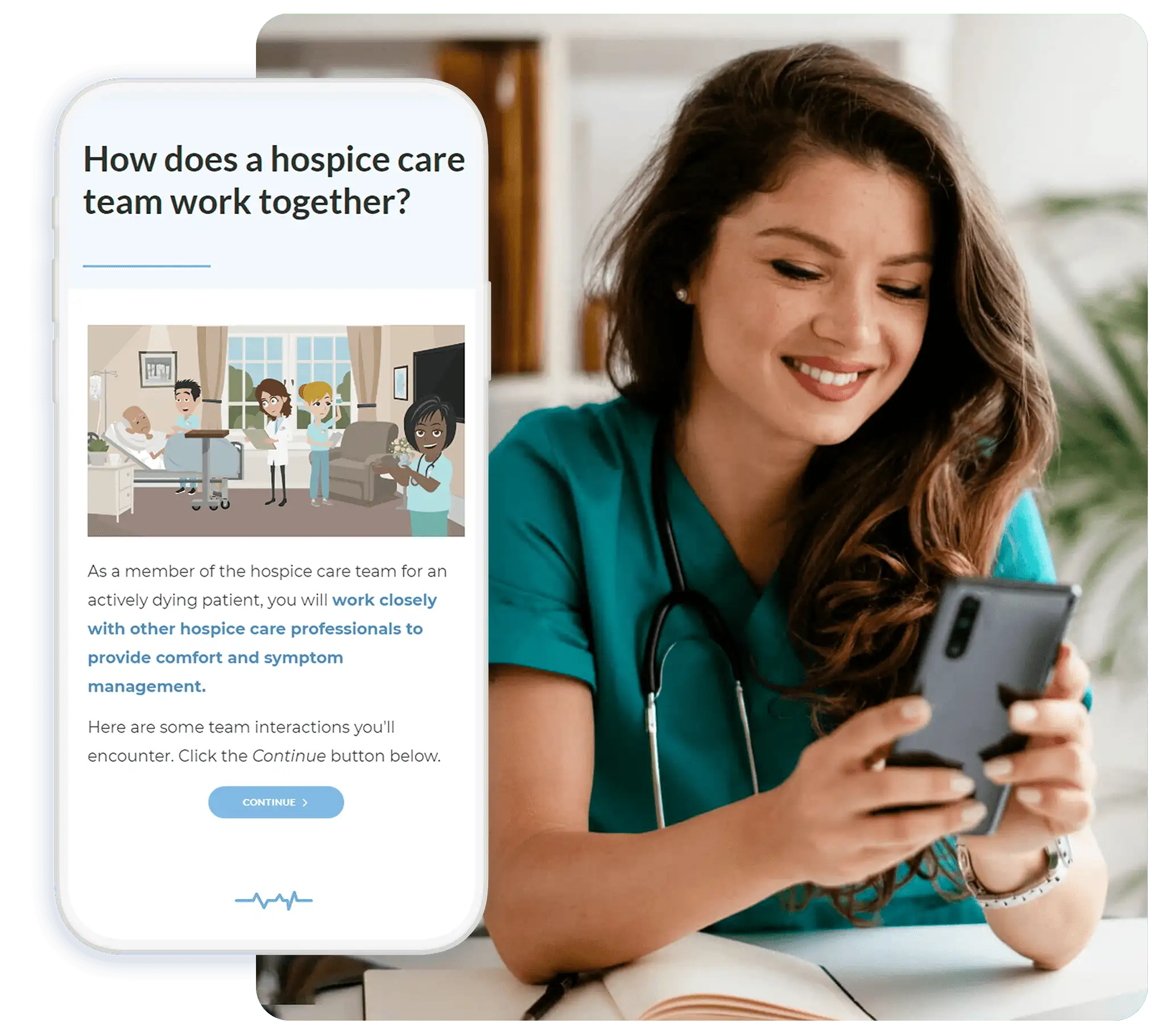Professional Boundaries Training in Hospice Care
Hospice Care’s Professional Boundaries Training provides a hands-on study of the vital subject of building sound relationships with patients and their families.
The content is designed to empower healthcare workers, especially nurses and hospice aides, to maintain a clear distinction between their professional duties and personal relationships with patients and families.
Skills You’ll Learn
- Identify and Define Professional Boundaries: Master recognizing where professional engagement ends and personal involvement begins.
- Strategize Boundary Setting: Learn tactics to establish clear and respectful boundaries with patients and families.
- Recognize Boundary Violations: Gain the ability to spot and address potential boundary crossings before they become problematic.
- Maintaining Balance: Develop skills to maintain a healthy balance between professional responsibilities and personal values.
- Navigate Boundary Challenges: Equip yourself with strategies to navigate common boundary challenges in hospice care.
- Protect Yourself and Your Patients: Understand the importance of maintaining boundaries to protect your well-being and that of your patients.

Professional Boundaries Training in Hospice Care Course Features
This online professional boundary skills training is built using Continua Learning action and skill-focused training:
- Action-Oriented Learning: Instead of just absorbing information, your staff will practice actions directly contributing to your agency’s success.
- Enhanced Hospice Compliance: With real-world scenarios, staff are better prepared for audits, ensuring your agency exceeds compliance standards.
- Engaging & Interactive: Gone are the monotonous click-next formats. Our courses are created with interactive elements that engage and reinforce learning.
- Patient Satisfaction: Real-world action-focused training leads to more competent care, directly impacting patient satisfaction and your agency’s reputation.
Course Description
Establishing the Line: Professional Boundaries in Hospice Care
As a healthcare professional in the hospice sector, your role is as demanding as rewarding. With “Professional Boundaries Training in Hospice Care,” you embark on a journey to delineate the lines between personal and professional, ensuring that your care remains as compassionate as it is ethical.
Understanding Boundaries
- What are professional boundaries?
- The continuum of professional behavior.
- Boundary crossings vs. boundary violations.

CONTINUA LEARNING
Simplify Your Hospice Team’s Training and Skill Building
A complete online solution for your agency: more than 125 hospice courses, caregiver in-services, training plans, and more.
The Art of Maintaining Boundaries
- Strategies for setting boundaries.
- Balancing empathy with professionalism.
- Protecting yourself from boundary challenges.
Practical Application in Hospice
- Real-world scenarios: When the personal encroaches on the professional.
- Drawing the line: Case studies and discussions.
- Personal and professional: Finding the balance in end-of-life care.
Boundary Challenges and Solutions
- Identifying boundary challenges in hospice settings.
- Resources and support systems for hospice workers.
- Creating a personal action plan to prevent boundary violations.
Throughout Professional Boundaries Training in Hospice Care, you will engage with thought-provoking scenarios and receive actionable strategies to maintain professional boundaries. By integrating the principles of boundary setting with the sensitive nature of hospice work, this training aims to fortify your resilience, enhance your care, and safeguard your practice.

How to Get Started with Professional Boundaries Training in Hospice Care
This course is designed for nurses, hospice aides, and palliative and hospice care providers seeking to reinforce their professional practice with robust boundary-setting skills.
How to Start Training
Professional Boundaries Training in Hospice Care is part of a yearly subscription to Continua Learning. Continua Learning delivers over 200 hospice training courses and aide in-services in a mobile solution for easy compliance and tracking it all from one place. Contact us to set up a demo for your agency today!
Elevate your expertise. Enhance patient satisfaction. Start training with the Professional Boundaries Training in Hospice Care course today.
Professional Boundaries Skills Training Continuing Education
Professional Boundaries Training in Hospice Care offers 1 Contact Hour for Nursing, Certified Nursing Assistants, Home Health, and Hospice Aides. Continua Learning is an approved provider of CEUs from the following boards:
- Florida Board of Nursing
- Florida Board Of Occupational Therapy
- Florida Board Of Speech – Language Pathology And Audiology
- Florida Board Of Nursing – Certified Nursing Assistants
Course Reviewer
Kathleen Webster, BSN, RN, CRRN, brings nearly four decades of nursing experience to her role. Earning her BSN in 1984 and CRRN in 2012, she began her career in acute rehabilitation and later specialized in hospice and home health care for over 25 years.
A seasoned educator, Kathleen has authored numerous eLearning courses and led in-service training programs. As a former community care program director, she trained in-home aides and is committed to inspiring quality care and compassion in hospice and home care.

FAQ
Why is understanding professional boundaries crucial in hospice and palliative care?
Grasping professional boundaries is essential to safeguard the delicate caregiver-patient dynamic in hospice and palliative care, ensuring ethical practice and emotional health.
How can hospice care workers maintain a compassionate approach without overstepping professional boundaries?
Hospice care workers can maintain this balance by employing clear communication, setting firm yet compassionate boundaries, and understanding the emotional nuances of palliative care.
What are the best practices for preventing boundary crossings in emotionally sensitive hospice situations?
The course offers best practices like scenario planning and active listening to anticipate and prevent boundary crossings in the unique context of hospice care.
What resources can I access if I encounter boundary challenges with a patient in palliative care?
Resources highlighted in the course include professional support networks, palliative care-specific counseling, and peer discussion forums.
How do I shield myself from boundary violations when dealing with end-of-life care?
Self-protection involves continuous self-reflection, seeking guidance from palliative and hospice care mentors, and adhering to the ethical guidelines specific to end-of-life care.
Are the skills learned in this course transferable to other areas within hospice and palliative care?
Yes, the skills for maintaining professional boundaries are universal within hospice and palliative care, regardless of the setting or stage of care.
What actions should be taken if a boundary violation is observed among hospice care staff?
It’s important to follow your hospice organization’s policies, which typically involve reporting the incident to a manager or the appropriate authority within the care team.

